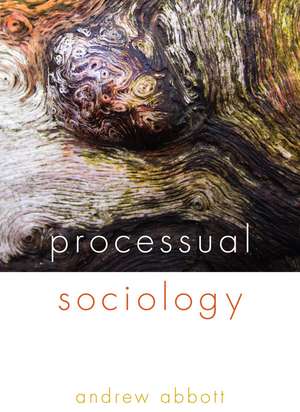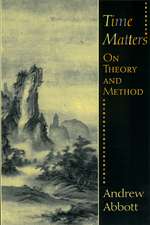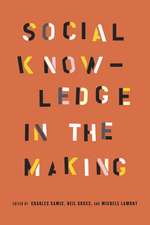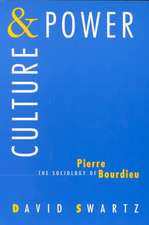Processual Sociology
Autor Andrew Abbotten Limba Engleză Paperback – 7 mar 2016
For the past twenty years, noted sociologist Andrew Abbott has been developing what he calls a processual ontology for social life. In this view, the social world is constantly changing—making, remaking, and unmaking itself, instant by instant. He argues that even the units of the social world—both individuals and entities—must be explained by these series of events rather than as enduring objects, fixed in time. This radical concept, which lies at the heart of the Chicago School of Sociology, provides a means for the disciplines of history and sociology to interact with and reflect on each other.
In Processual Sociology, Abbott first examines the endurance of individuals and social groups through time and then goes on to consider the question of what this means for human nature. He looks at different approaches to the passing of social time and determination, all while examining the goal of social existence, weighing the concepts of individual outcome and social order. Abbott concludes by discussing core difficulties of the practice of social science as a moral activity, arguing that it is inescapably moral and therefore we must develop normative theories more sophisticated than our current naively political normativism. Ranging broadly across disciplines and methodologies, Processual Sociology breaks new ground in its search for conceptual foundations of a rigorously processual account of social life.
In Processual Sociology, Abbott first examines the endurance of individuals and social groups through time and then goes on to consider the question of what this means for human nature. He looks at different approaches to the passing of social time and determination, all while examining the goal of social existence, weighing the concepts of individual outcome and social order. Abbott concludes by discussing core difficulties of the practice of social science as a moral activity, arguing that it is inescapably moral and therefore we must develop normative theories more sophisticated than our current naively political normativism. Ranging broadly across disciplines and methodologies, Processual Sociology breaks new ground in its search for conceptual foundations of a rigorously processual account of social life.
Preț: 241.64 lei
Nou
Puncte Express: 362
Preț estimativ în valută:
46.24€ • 48.41$ • 38.26£
46.24€ • 48.41$ • 38.26£
Carte tipărită la comandă
Livrare economică 07-21 aprilie
Preluare comenzi: 021 569.72.76
Specificații
ISBN-13: 9780226336626
ISBN-10: 022633662X
Pagini: 336
Ilustrații: 1 line drawing, 1 table
Dimensiuni: 152 x 229 x 23 mm
Greutate: 0.41 kg
Ediția:1
Editura: University of Chicago Press
Colecția University of Chicago Press
ISBN-10: 022633662X
Pagini: 336
Ilustrații: 1 line drawing, 1 table
Dimensiuni: 152 x 229 x 23 mm
Greutate: 0.41 kg
Ediția:1
Editura: University of Chicago Press
Colecția University of Chicago Press
Notă biografică
Andrew Abbott is the Gustavus F. and Ann M. Swift Distinguished Service Professor at the University of Chicago. He edits the American Journal of Sociology.
Cuprins
Preface
Part 1
1 The Historicality of Individuals
2 Human Nature in Processual Thinking
3 Linked Ecologies
Part 2
4 Lyrical Sociology
5 The Problem of Excess
Part 3
6 The Idea of Outcome
7 Social Processes and Social Order
Part 4
8 Inequality as a Process
9 Professionalism Empirical and Moral
Epilogue
References
Index
Part 1
1 The Historicality of Individuals
2 Human Nature in Processual Thinking
3 Linked Ecologies
Part 2
4 Lyrical Sociology
5 The Problem of Excess
Part 3
6 The Idea of Outcome
7 Social Processes and Social Order
Part 4
8 Inequality as a Process
9 Professionalism Empirical and Moral
Epilogue
References
Index
Recenzii
“Abbott has long been one of sociology’s most fertile and original thinkers. These lucid and challenging essays display Abbott’s remarkably wide-ranging sociological intelligence at its best. Cumulatively, they articulate the core principles of a distinctively processual sociology, and they challenge us to recognize the irreducibly humanistic and moral nature of the sociological enterprise.”
“Processual Sociology’s essays draw on a dizzying range of sources and examples, blended into a stunningly original, disruptive, and fecund analysis. The interrogation of such basic concepts as actor and outcome; the insights into the way that sequence and ecology frustrate causal reasoning; the effort to reconstitute macro-sociology on a radically micro-sociological foundation; and the reclamation of the moral dimension are just a few of this volume’s important themes. Processual Sociology is both a good read and an ambitious and compelling challenge to the way that social scientists understand and carry out their craft.”
“In Processual Sociology, Abbott makes clear that his ambition is to change sociology fundamentally. In elegant but also rigorous essays, he connects his seemingly disparate past writings and foreshadows a basic rethinking of social ontology. This starts from the historical character of individual life and moves on to connect historical demography to the nature of groups, the constant making and remaking of all cultural and social relationships, and the inextricable connection between the empirical and the moral. It is a brilliant book that makes one want to drop everything else to join in thinking about sociology’s hardest, most basic questions.”
“Abbott is the most surprising and innovative of today’s social theorists, in part because he combines disciplines as diverse as mathematical philosophy and literary theory. His work cuts in an entirely different way across the quantitative/qualitative and most other divides. Abbott repeatedly reverses the gestalts, advocating a lyrical sociology of contemporaneous flows rather than narratives explaining ‘outcomes’ abstracted from time, proposing that more is explained by problems of excess than problems of scarcity, and exposing concepts of inequality that run contrary to what we do in our own lives. This is a book to change the way sociologists think.”
“Varieties of Social Imagination is an experiment in rejecting these habits, and its rhetorical tactic of choice—decentralizing the author’s history and identity—seems aimed at delivering a shock to our identity-obsessed twenty-first-century systems. The author constructs a female persona who reviews old works of social theory, with no one era, nationality, or gender favored.”
“Abbott’s initial consolidation of his general theory, Processual Sociology, long in development, is such a welcome intervention. Reading the book is like opening the windows in an old, abandoned house, letting the wind sweep away the dust and cobwebs to reveal perfectly useable furnishings and foundation. Without hyperbole, the book should be required reading for every working sociologist, not least because processual sociology takes for granted, and is perfectly compatible with the ontological, structurational and liquid turns mentioned above. Indeed, process is the norm. . . . Many readers might be familiar with Abbott’s work on ‘linked ecologies’, ‘lyrical sociology’ or ‘outcomes’ – each of which works as a stand-alone essay. But, the collection is undoubtedly greater than the sum of its parts, bringing into view the long gestation and effort the Chicagoan has been elaborating piece by piece for over twenty years.”
“Abbott’s essays demand the full attention of their readers because, unlike almost any other current theorist, Abbott’s passionate attachment to the humanities, in conjunction with vigorous attention to slick methods, gives his voice the unique authority it has on the current intellectual scene.”
“Abbott’s book is such a rich and complex one that it is not easy to give a summary of its contents. . .The point of Abbott’s book is to change the way of thinking about social phenomena rather than lay out rules of sociological method.”
“Andrew Abbott’s new book is another masterful installment in what is now a long series of important works by one of the leading sociologists in the United States. The reader of Processual Sociology will find some very creative and useful ideas in its pages. Abbott’s work, in brief, represents a most welcome contribution to modern sociology.”
“One cannot discuss contemporary sociology without mentioning the work of Andrew Abbott. . . .Processual Sociology well represents his admirable intellectual diversity [and] merits attention from practitioners within all domains of the discipline.”
"Andrew Abbott is one of those rare sociologists who are able to speak to different audiences without losing any of their rigorous arguments, their charm, or their ability to stimulate the sociological imagination. . . . Almost every book he writes is capable of taking center stage among sociological research by virtue of his extraordinary eclecticism, absolute mastery of data, and sociological writing that is, at times, captivating and always reflective of deep thought."















